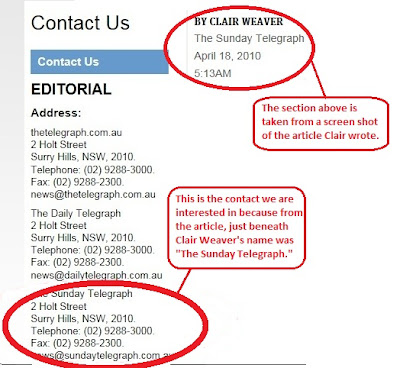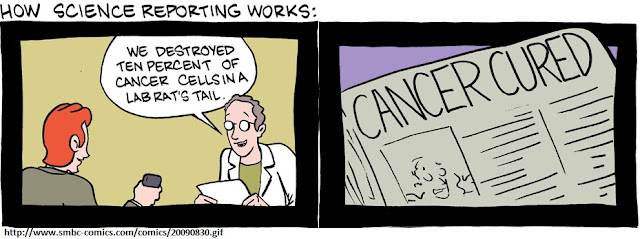I will be drawing my examples from a news article. This article about how multi-vitamin pills are linked to breast cancer stirs up several problems suggesting why it is an unreliable resource. Here are a few reasons why.
1) It was written by Clair Weaver, who is neither a doctor nor a scientist, but a journalist. She could have easily reworded or misunderstood what the scientists she retrieved this information from incorrectly.
2) This article was written in 2010 which is 2 years ago from now, signifying that the information presented is out dated.
 3) It is very difficult to
contact this author, Clair Weaver. Just below Clair’s name was a
link to the Telegraph webpage which I was able to then click the “Contact Us”
button that guided us to a list of contact numbers, as shown to the right. This, however, took several steps to get to just to get in touch with this author.
3) It is very difficult to
contact this author, Clair Weaver. Just below Clair’s name was a
link to the Telegraph webpage which I was able to then click the “Contact Us”
button that guided us to a list of contact numbers, as shown to the right. This, however, took several steps to get to just to get in touch with this author.4) The author tells us very little about the experiment conducted. Some arguments that should be included is the method of the experiment, the sample of population or area of Australia these women were experimented on, or other factors such as subjects everyday routine, and their physical health, etc. We, as the reader, have little insight on what is actually going on behind the labs which is why this article needs to also present how this experiment was treated with citations or references, etc.
6) Another reason why this
article lacks credibility is that there is a bias to promote natural foods as
the source of nutrients rather than vitamin pills. I also believe that eating
natural foods is the better resource, but I do not feel that demoting multi-vitamin
pills and claiming it is a cause of breast cancer is the way to do it.
2) Like the other website, this too is a news article however; this one is properly referenced with scientific evidence supporting their claims which was proved by an experiment. Within the article, the author also included the original link to the experiment.
3) This link also specifically says that their results is not influenced by the amount of views or comments they receive, and that if these factors did contribute to their conclusions it would be stated.
Both of these websites come from news articles, and reporters can have the possibility of interpreting certain information incorrectly. So with all these facts in mind, I hope you have a better understanding of how to decipher the difference between a legitimate website from another.
Just always remember, be careful with what you read and hear.
You be the judge, is it true or false?


